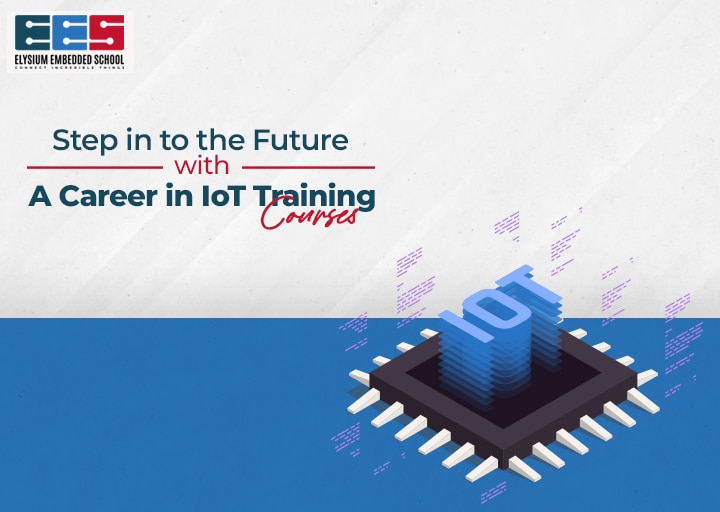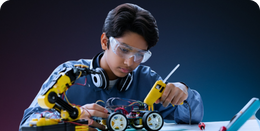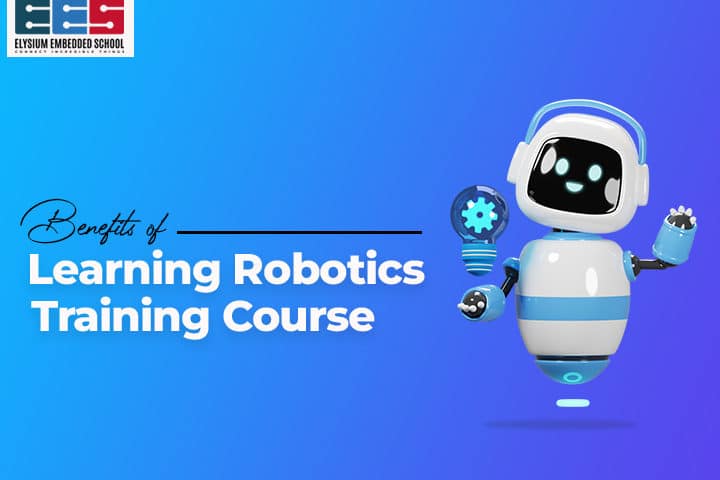
Step into the Future with a Career in IoT Training courses
January 25, 2023
Enhance Your Career Scope through Microcontroller Training Course
March 15, 2023Robotics is a fun and innovative educational tool that grows in importance every day as students gain wisdom and skills that will help them in the future through their leisure activities. In addition, the engineering department specializes in the entire robot design, construction and application process. Therefore, knowing the basics and introducing robotics will be very helpful for the little ones in the house. Equipped with robotics toys.
The use of Robotics Training Courses for children in education may stem from teachers’ quest to create conducive learning environments in which students are protagonists in constructing knowledge. This allows us to respond to the needs arising in today’s information age-immersed society through cognitive and metacognitive processes. Moreover, educational developments must be aligned in order to use current technological advances for better impact. For this reason, robotics is a very important tool in a child’s education, and when used correctly it can help them understand many concepts, develop new ways of thinking, and enhance personal creativity.
Introducing robotics training courses at an early stage not only cultivates interest in science and technology but also strengthens essential developmental skills such as logical reasoning, spatial awareness, and structured thinking. Through engaging projects and interactive learning, children begin to understand the relationship between cause and effect, experiment with solutions, and refine their approaches based on outcomes. This iterative process nurtures a mindset of inquiry and adaptability—qualities that are vital in an era where technological fluency and problem-solving are core to both academic success and future career opportunities.
Table of Contents
Why Are Robotics Training Courses Important?
1. A Gateway to STEM Learning
Robotics Training Courses provide an exciting and accessible entry point into STEM education. Subjects like mathematics, science, engineering, and technology are often seen as challenging or abstract by many students. However, robotics transforms these subjects into interactive and hands-on experiences. By building and programming robots, learners develop a natural curiosity and a deeper understanding of key STEM principles, all while having fun.
2. Hands-On Learning That Sticks
Unlike traditional classroom lectures, robotics involves active learning through experimentation and problem-solving. When students engage in designing, assembling, and coding robots, they learn by doing. This experiential learning process leads to better retention of knowledge and fosters independent thinking. The skills gained go beyond technical know-how—they learn how to troubleshoot, adapt, and innovate in real-time.
3. Building Real-World Skills for Future Careers
As automation and intelligent systems become more common across industries, the demand for robotics skills is rising. Through Robotics Training Courses, students gain exposure to practical tools and technologies used in real-world applications. They develop skills in programming, electronics, mechanical design, and systems integration. These capabilities are foundational for future careers in fields such as robotics engineering, AI, aerospace, automation, and computer science.
4. Fostering Creativity and Critical Thinking
Robotics challenges students to think creatively. Whether they’re programming a robot to navigate a maze or automating a simple task, they are constantly solving problems and optimizing their designs. This kind of open-ended challenge fosters both innovation and analytical thinking. It also teaches them how to learn from failure—an essential skill in both education and life.
5. Encouraging Collaboration and Communication
Most Robotics Training Courses include team-based projects, allowing students to collaborate and communicate effectively. They learn how to share ideas, delegate tasks, and work together toward a common goal. These soft skills—teamwork, leadership, and communication—are just as important as the technical skills in today’s job market.
6. Inspiring Long-Term Interest and Passion
Perhaps most importantly, robotics inspires curiosity. When students see a robot they built move or respond to commands, it creates a powerful sense of achievement and motivation. Many students discover a lifelong passion for technology through these early experiences, which can guide their educational and career paths moving forward.
Robotics Enhances Practical and Professional Learning
Learning robotics empowers students to develop a wide range of skills that are essential for both academic success and future career readiness. It transforms abstract technical concepts into engaging and meaningful learning experiences, helping young learners build confidence, creativity, and practical knowledge.
Connecting Learning with Real-World Applications
Robotics education provides students with opportunities to apply concepts from mathematics, science, and computer programming in realistic scenarios. As they build, program, and troubleshoot robotic systems, learners begin to see how classroom lessons translate into technology used in industries such as automation, manufacturing, and artificial intelligence.
Building Core Technical and Cognitive Skills
Through robotics training, students strengthen their understanding of mechanical design, logical sequencing, electronic systems, and programming. They also develop critical thinking and analytical abilities as they design solutions, identify challenges, and improve their projects through trial and revision.
Strengthening Soft Skills That Matter
Robotics projects foster the development of soft skills that are essential in both academic and workplace environments. These include:
-
Problem-solving: Identifying issues and thinking through creative solutions
-
Patience and resilience: Learning through trial and error encourages perseverance
-
Attention to detail: Precision is required in both building and coding robots
-
Teamwork and communication: Many projects require collaboration and clear idea exchange
These skills not only enhance a student’s technical profile but also prepare them to thrive in collaborative and professional settings.
Sparking Interest in Future-Focused Careers
Exploring robotics can inspire students to pursue careers in high-demand technology sectors. Whether they are interested in engineering, data science, robotics design, or automation, early exposure builds awareness and understanding of emerging fields. It encourages students to align their strengths with future academic or career goals.
Encouraging Innovation and Creativity
Robotics nurtures innovation by allowing learners to create something meaningful from scratch. It stimulates curiosity, supports independent thinking, and encourages exploration. As students experiment and improve their designs, they develop an innovative mindset that can be applied across many disciplines.
Develops the Skills of Tomorrow through Robotics Training Courses
Robotics prepares students for tomorrow’s competitive workforce. Robotics training courses enable children to work on life and social skills. These skills will help you stand out from the crowd in front of future employers. Robotics are breaking new ground in how we learn all over the world. It is imperative now to prepare our children for tomorrow’s changes in all areas of life, personally, at school, and professionally.
Certainly! Here’s a blog-optimized and more detailed version of your content under the heading:
Encourage Curiosity in STEM Through Robotics Training Courses
In today’s technology-driven world, cultivating an early interest in STEM—science, technology, engineering, and mathematics—is more important than ever. However, traditional teaching methods often fail to spark genuine enthusiasm among young learners. That’s where Robotics Training Courses come into play, transforming the learning experience from passive memorization to active, hands-on discovery.
Robotics provides a tangible connection to complex STEM principles. Instead of simply learning about circuits, sensors, or algorithms in theory, students build robots that bring these concepts to life. They write simple code to make motors spin, integrate sensors to detect obstacles, and explore how mechanical and electronic systems interact. This direct engagement helps demystify STEM subjects, making them more approachable and exciting.
Moreover, robotics encourages students to think critically and creatively. When faced with challenges—like programming a robot to follow a specific path—they must apply problem-solving strategies, test hypotheses, and troubleshoot errors. These real-time problem-solving experiences not only reinforce academic concepts but also develop resilience and curiosity, two qualities essential in both academic and real-world settings.
By introducing Robotics Training Courses at an early age, we nurture a generation that doesn’t just consume technology but understands how it works and how to innovate with it. This exposure builds a strong foundation for further STEM education and opens doors to future careers in engineering, artificial intelligence, data science, and more.
Ultimately, robotics isn’t just about machines—it’s about empowering young minds to question, explore, and imagine what’s possible. That’s the kind of mindset that drives meaningful progress in STEM fields and beyond.
Hone Coding Skills
During the programming phase of building a robot, students work on combinations of various computer programming codes. They write, test, run, and find bugs and fix code problems. Continued practice strengthens your programming skills and gives you a head start in your computer science career.
Learn to be a problem, Solver
Robots are designed and programmed to perform difficult tasks that humans cannot. When building a robot, children think of a problem and try to solve it in the easiest way possible with the help of the robot. Robotics turns children into true problem solvers.
Here is an improved version of your section “Optimum Preparation for the Future”, enhanced with meaningful subheadings and expanded for clarity and flow:
Optimum Preparation for the Future
As technology continues to advance, the demand for skilled robotics professionals is growing rapidly. Robotics Training Courses not only lay the foundation for future academic and professional success but also prepare students to thrive in a competitive, innovation-driven world.
Expanding Career Opportunities
There is a significant and growing market for individuals trained in robotics. From established tech companies to emerging startups specializing in drones, automation, and artificial intelligence, the career possibilities are vast. Industries such as defense, healthcare, space research, agriculture, and logistics actively seek professionals with robotics expertise to drive innovation and efficiency.
Internships and Industry Exposure
Many companies are now offering internships and training programs to robotics students, especially during summer breaks. These opportunities provide valuable real-world exposure, allowing students to apply their classroom learning to practical environments, gain mentorship from professionals, and build networks within the industry.
Early Learning Leads to Long-Term Success
Introducing robotics education at a young age allows students to identify and nurture their unique interests and talents. Whether they are inclined towards hardware design, programming, or mechanical systems, early engagement helps shape a clearer academic and career path. It also fosters confidence, independence, and resilience—skills that are essential across all disciplines.
Robotics as a Cross-Disciplinary Skill
Robotics integrates multiple disciplines including electronics, programming, artificial intelligence, and mechanics. This cross-functional nature equips learners with a broad skill set that is not only useful in robotics-specific roles but also applicable to a wide range of tech-driven careers. As industries evolve, having a background in robotics provides a strategic advantage for future success.
The Importance of Robotics for School-Going Children
Teaching technical knowledge to young learners has always presented challenges. However, the emergence of Robotics Training Courses is transforming education by making technology fun, engaging, and interactive. Integrating robotics into school curricula not only builds technical literacy but also fosters critical life skills essential for the future.
Enhancing Communication and Language Skills
One of the surprising benefits of robotics education is its ability to improve communication skills. When students explain their robot’s functionality, present project ideas, or troubleshoot problems, they naturally engage in verbal and written expression. This strengthens vocabulary, enhances clarity, and boosts confidence in public speaking—skills that are valuable across all academic disciplines.
Encouraging Innovation and Critical Thinking
Robotics requires students to think critically and innovatively. Building and programming robots involve constant problem-solving and logical reasoning. Whether debugging a line of code or designing a functional prototype, students learn to analyze, evaluate, and iterate—developing a mindset that embraces challenges rather than avoids them.
Making STEM Concepts Practical and Engaging
Traditional STEM subjects like mathematics and physics can often seem abstract to young learners. Robotics brings these subjects to life. By applying theoretical concepts in hands-on projects, students gain a tangible understanding of ideas like motion, force, energy, and computing. This practical application turns passive learning into active discovery.
Sparking Curiosity About the Future
Robotics has a futuristic appeal that naturally excites young minds. When children build or interact with robots, they begin to imagine themselves in roles like engineers, inventors, or computer scientists. This exposure at an early age can help shape career aspirations and fuel long-term interest in technology.
Building Leadership, Teamwork, and Social Skills
Many robotics training courses encourage collaboration through group projects and team challenges. Students must plan together, share responsibilities, and resolve conflicts constructively. These collaborative environments help students develop interpersonal skills such as leadership, empathy, and cooperation—preparing them for real-world workplace dynamics.
Adapting to Diverse Learning Styles
Every student learns differently. Robotics supports a variety of learning styles—visual, auditory, kinesthetic, and logical. Through designing, building, coding, and testing robots, learners engage multiple senses and cognitive skills. This inclusive approach ensures that all students, regardless of background or ability, can thrive.
Promoting Confidence
There’s immense satisfaction in seeing a robot you’ve built function correctly. This sense of accomplishment boosts students’ confidence and reinforces their belief in their abilities. As they overcome technical obstacles and complete projects, they develop resilience and a growth mindset that applies well beyond the classroom.
Preparing for a Technology-Driven Future
From aerospace to automation, robotics plays a central role in shaping industries. By participating in Robotics Training Courses early, children acquire technical fluency and soft skills that are in high demand. They also gain a head start in understanding emerging technologies and potential career paths in engineering, AI, and computer science.
Frequently Asked Questions (FAQs)
1. Who can enroll in the Robotics Training Courses offered by Elysium Embedded School?
Anyone with an interest in robotics, especially school-going children, young learners, and STEM enthusiasts, can enroll. Elysium Embedded School designs its Robotics Training Courses to be beginner-friendly and highly interactive, making them ideal for students from elementary to higher secondary levels.
2. What are the benefits of enrolling children in Robotics Training Courses at Elysium Embedded School?
Elysium Embedded School’s Robotics Training Courses enhance creativity, logical thinking, and problem-solving skills. Children learn coding, teamwork, communication, and critical thinking through hands-on, real-world robotics projects aligned with the STEM curriculum.
3. Does Elysium Embedded School offer project-based learning in its Robotics Training Courses?
Yes. Elysium Embedded School integrates project-based learning in all Robotics Training Courses. Students engage in building, programming, and troubleshooting robots, which helps them apply theoretical knowledge to practical challenges.
4. How do Robotics Training Courses at Elysium Embedded School support future career paths?
Robotics Training Courses at Elysium Embedded School prepare students for future careers in engineering, automation, AI, and computer science. The training builds both technical and soft skills that are valuable in the modern workforce.
5. Is prior programming knowledge required to join the Robotics Training Courses at Elysium Embedded School?
No prior programming experience is required. Elysium Embedded School offers structured Robotics Training Courses that begin with fundamental concepts, making them suitable for beginners as well as students with some prior exposure to coding or electronics.
Conclusion
Robotics Training Courses that is slowly gaining popularity. In Elysium Embedded School Robotics Courses open a world of possibilities for those who are interested. By going through the process of building a robot in the classroom, the student explores different robotics and her STEM learning paths. Therefore, robotics for children in education is no longer a topic in school curricula. Still, through didactic activities using technological means, knowledge is activated and constructed, actions are generated, and students’ interest is aroused, and thus science is aroused. Learning and technology are encouraged while finding solutions to challenges, immersing themselves in environments, and fostering the development of thinking skills.













